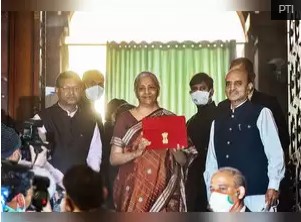Budget 2024: Sitharaman may ramp up efforts to boost consumption demand, rural economy

Budget 2024: Finance Minister Nirmala Sitharaman is set to present her sixth consecutive Budget with the focus on infusing more funds into the public’s hands. Potential adjustments to tax slabs or an increase in standard deductions may be implemented. The budget may also allocate more funds for the rural employment guarantee scheme MGNREGA and offer higher payouts for farmers. Women and marginalised communities are likely to receive additional .
Finance Minister Nirmala Sitharaman is gearing up to present her sixth consecutive Budget on February 1. The focus of the budget is likely to be on infusing more funds into the hands of the public, with potential adjustments to tax slabs or an increase in standard deductions as possible avenues for achieving this goal.
Another proposal is related to increasing the funds under the rural employment guarantee scheme MGNREGA and higher payout for farmers, reported PTI.
Women and marginalised communities may get additional sops as part of Nirmala Sitharaman’s effort to boost consumption ahead of the general elections, PTI cited experts as saying.
Usually, interim Budgets, which are presented in the Lok Sabha ahead of the general elections, do not contain fresh tax proposals or new schemes.
It may contain proposals to address immediate economic problems, which cannot wait 4 months when the full budget is presented after the formation of the new government.
It may contain proposals to address immediate economic problems, which cannot wait 4 months when the full budget is presented after the formation of the new government.
Deloitte India Partner Rajat Wahi said that in the case of FMCG and most of the products people consume on a daily basis, consumer goods companies have increased the prices in 8-10 quarters mainly due to an increase in input costs.
“So, global supply chain impact, input prices going up, inflationary impact, interest rates going up, all of this is impacting the lower income. It’s not only rural, it is the poor segment of urban areas where are seeing these issues,” Wahi said.
Wahi said the bigger impact of the price rise is being felt by the poorer section of society as the number of loan defaults has significantly increased, he added.
According to advance estimates of GDP, the agriculture sector growth is expected to decelerate to 1.8 per cent in the current fiscal from 4 per cent in 2022-23.
India Ratings & Research Chief Economist Devendra Kumar Pant said the main purpose of a vote-on-account is to allow the government to spend money on salaries, wages, interest payments, and debt services for four months of the next fiscal.
“But, if there is a certain section of society which is under stress, can we wait for 4-5 months to take any action? If in 5 months, if we don’t do anything, the situation may turn from bad to worse. There may be some intervention for certain vulnerable sections (in the interim Budget),” Pant said.
The Index of Industrial Production (IIP) data for April-November revealed that the output of consumer durables decelerated to 0.6 per cent, against 5.3 per cent in the same period last year.
Although the consumer non-durables output rose to 5.6 per cent during the eight-month period of 2023, it was on a favourable base as the output had declined 2.2 per cent in the April-November period of 2022.
One of the ways by which consumption demand can be increased is by tinkering with the new tax regime by making it more attractive, thus leaving more money in the hands of taxpayers.
“Tax slab tweaking is always a case for consideration in Budget… In the new tax regime there may be a pressure on the Government to include deductions for interest on home loans,” Deloitte India Partner Sanjay Kumar said.
The government anyway wants more and more people to migrate to the new tax regime, which has a lower rate but with fewer exemptions, from the old tax regime in which a taxpayer can claim of host of deductions for specified expenses like home loans, children’s education, PPF contribution, and insurance premium.
In addition to MGNREGA (Mahatma Gandhi National Rural Employment Guarantee Act), the interim budget is also likely to allocate funds for PM Vishwakarma Yojana and other skill development programmes of the government.
Source : Economics Times PTI
